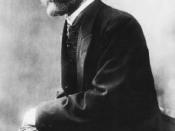What exactly is the function of educating individuals in our capitalist society? Are we really educated individually, or is the system there simply to churn out a workforce to meet our society's growing needs? I plan to look at the views of this matter from different sociologists' perspectives, and examine the ideas behind the function of education - whether it really is a fair an just system, offering us all the chance to succeed, regardless of our background.
What is education? Is it merely the act, or process of acquiring knowledge? From a sociological perspective, there is a lot more to it. Education can be looked at as a method of socialization - preparing us for life in society, and a system used to sort, sift and grade us on terms of ability. But is education unpretentiously doing this? Or are there factors of inequality to be accounted for?
In Britain, the state became involved in education in 1833, where some funding was provided for religious schools.
The industrial revolution had come about long before this, and children up until this point were used as factory workers. In 1844 the Factory Act required children in employment, aged 8-13 to spend half the week in education. In 1880 attendance to publicly funded schools was made compulsary up until the age of 10, and eventually, in 1944, free secondary education for everyone was introduced, and the school leaving age raised to 15 in 1947, and again in 1972 to the age of 16, the current leaving age.
Emile Durkheim, a famous French sociologist, looked at education from a functionalist perspective. He felt that the major function of education was to transmit the norms and values of society. 'Society can only survive if there exists amongst it's members a sufficient degree of...


